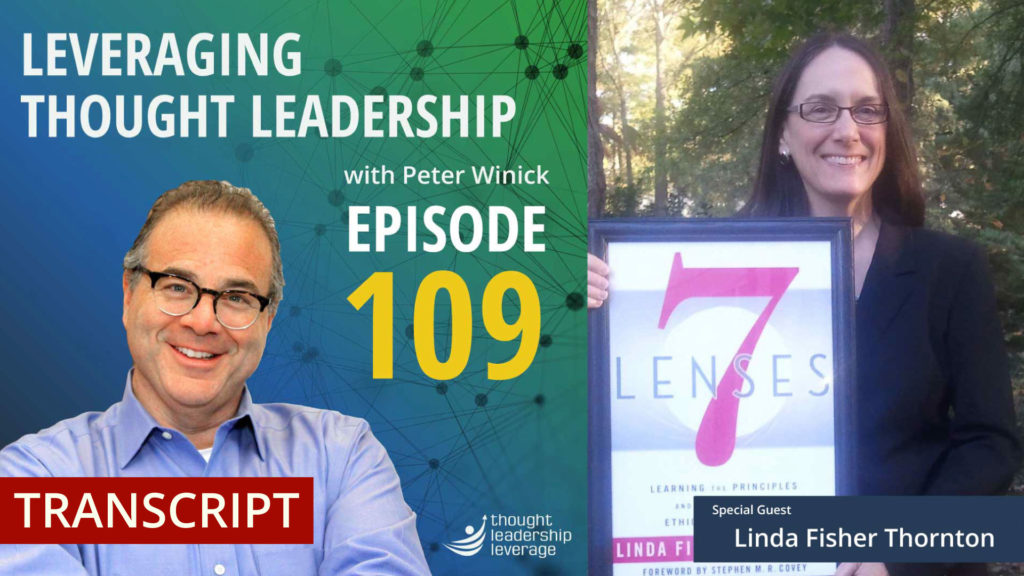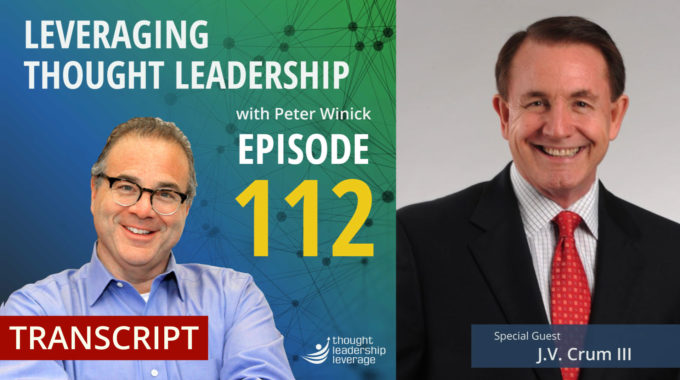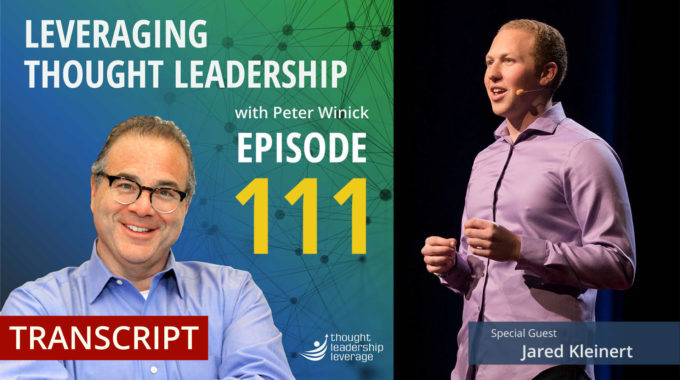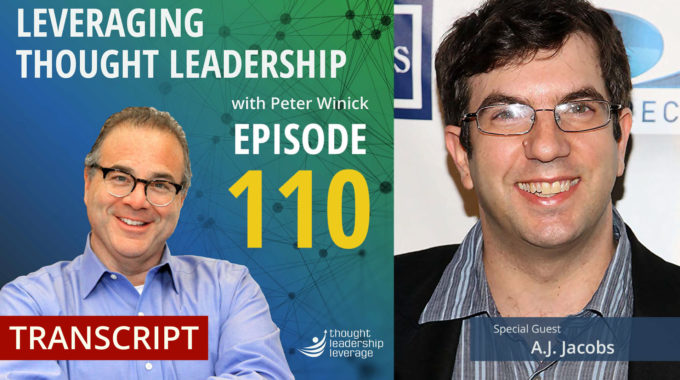Helping Your Thought Leadership Marketing Find Range, Reach, and Results. An interview with Charlene…
Ethical and Meaningful Thought Leadership Content | Linda Fisher Thornton
Creating Ethical and Meaningful Thought Leadership Content
An interview with Linda Fisher Thornton about creating ethical and meaningful thought leadership content, and how to disseminate your work in a way that benefits others as well as bringing you success.
Summary: We interviewed Linda Fisher Thornton, author of 7 Lenses and CEO of Leading in Context. We talk about ethical leadership, trailblazing with thought leadership content, and pushing yourself beyond your limits to create your best work.
Three Key Takeaways from the Interview:
- Why should we strive to create ethical and meaningful thought leadership content?
- How writing a book from your thought leadership content can be a grueling – but ultimately rewarding – task.
- How to revitalize your content through multiple modalities, and keep it fresh for new and widening audiences.
Transcript:
Peter And welcome, welcome, welcome. This is Peter Winick, I’m the founder and CEO of Thought Leadership Leverage, and you’re joining us on our podcast today, which is Leveraging Thought Leadership. Today, I’m really excited for our guest, who is an old friend, Linda Fisher Thorton. Linda is an innovative leadership development consultant with a passion for ethical leadership. I would actually go further and say she’s probably one of the leaders in the field of ethical leadership. Her book, Seven Lenses and it’s in a second printing, which is pretty cool. And it introduces a very practical Seven Lens model for seeing ethical complexity and 14 Guiding Principles for Learning Ethical Leadership. Linda is a former bank senior vice president. We won’t hold that against her. And she’s now the CEO of Leading in Context. She’s been in leadership development space for over twenty-five years. She’s on Things magazine of top 100 leadership speakers, and she works with folks across the spectrum for a not for profit. She’s also an adjunct professor at University Richmond SPCA. So welcome aboard, Linda. So much for joining us today.
Linda Fisher Thornton Oh, thank you for having me.
Peter It’s my pleasure. So where do we start? You’ve written this book, which has become I would, I would argue, sort of the standard in ethical leadership. So, what was it like sort of breaking into this sort of new space because you had your leadership development and academic career? And then this was this was sort of a passion project that was going for a while. And then you decided to dive in. So, what was that like?
Linda Fisher Thornton It definitely was a new space in that the Seven Lenses provides a multi-dimensional perspective on ethical responsibility, where instead of just looking at character or sustainability or one or two pieces of it, it’s a more holistic model. And so, people didn’t know there was such a thing available because it wasn’t until the book came out. So I was basically delving into a new space where people didn’t know there was something there and they didn’t know that they could use it. They didn’t know they needed it. So it has taken some time for people to discover it. I would have to say the easy part was identifying the gap, seeing the need for something to be where this model ended up being. And the harder part was learning how to fill that space in ways that work. One of the initial issues was what I think about as answering the call to do this work and overcoming 100 reasons why it wouldn’t be good for me to do it. You know, no one else has been able to figure this out. No one else has defined ethical leadership in a way that people could agree to for centuries. Maybe it’s impossible. I don’t have the time. It will be too expensive. It’ll be too hard. It’ll take too long. I’m already busy. And as fate would have it, we then entered into an economic downturn, right where I had major clients and major projects. I was booked for the year and then projects went on hold as companies were facing the economic downturn. And I also had been helping take care of my grandmother for nine years. She passed away. It was just this realization, if I’m ever going to do something important with my life, OK? This is the time. You know, this is the time to do it. The space had opened up with the economic downturn. And there I had imagined something that should go into this space. And then I basically had this outrageous goal of moving the field of ethical leadership forward and changing how we teach leaders about ethical responsibility and taking that conversation to a higher level of complexity. And so people thought I was crazy. You know, I posted on Twitter, I’m on a mission declare lead ethically in a global society and a leadership professor tweeted back. Yeah, good luck with that.
Peter I said, well, sometimes and I think you’re an amazing example of true thought leadership. Right. And what I mean by that is oftentimes people sort of just join the conversation. Rachael, if we were to take your book and sort of split it, there’s a lot going on in the ethics world. And you could have gone there and added right into the conversation, but it wouldn’t have been as distinct. You could have moved over to the other side leadership. We’ve got a lot of experience and added some stuff there. But you decided to sort of create a new thing and there’s a cost to that in terms of before you can actually engage people, you have to create this level of awareness that this is a new thing and it’s real. Right. Right. And you’re serious about it and done my homework on it and you’re passionate about it. And it might be easier to sort of go one path on the other because others have sort of blazed the trail or worry. But you’re clearly a leader in this space about the leadership. Let’s talk for a little bit around. You know, one of the things that I know from our work together is you really listen quite loudly to what the market wants. And you had some preconceived notions around the things that you want to do and don’t want to do. I remember, you know, I don’t do keynotes. And I said, OK, you know, that’s a great story to share with other people because I had to listen to what people really wanted and needed.
Linda Fisher Thornton I had to let go of how I thought things should be, how I wanted them to be in order to meet their needs and kind of step outside of myself. I didn’t like the way sometimes keynote speakers would talk at groups. And so, and I’m a trained facilitator, I would facilitate high level of G and leadership development. And so, I didn’t really want to talk at groups. So, in the beginning, I said, well, you know, I just don’t do keynotes. And then, of course, the first paying client that reached out to me after the book came out wanted to keynote.
Peter But I want to dig into the keynote issue. So it’s not just that it’s a personal preference. You know, I like them or I don’t like them. Right. But, you know, it’s people, I think, misunderstand what the expectation is from a keynote. So first of all, there’s two masters that you have to serve. There’s the participant who may be a volunteer or may not. Right. They may have opted to go to that program. Right. Or they may have been, volun-told. Right. It’s our company, off-site, and Linda is our speaker and sit here and be engaged, etc. But then there’s also the person buying the speech, right? And yes, I would argue that a keynote is not learning happens. T-note is not the optimal learning environment is very monologue versus dialog. It’s not designed it’s designed more around typically not always being somewhat entertaining and engaging in a flesh around getting people to understand and internalize things. And I think from a stylistic perspective towards me about that’s probably why you weren’t all keen on saying, yes, I will be a keynoter is.
Linda Fisher Thornton That is exactly right. And so, what I had to do was get over that thinking and move out of my own way and grow into it and put my own spin on it. So, I love doing keynotes now, but they’re not your typical, traditional keynotes. I do incorporate dialog and there’s a facilitation feel to my keynotes that’s more engaging for groups. And it works for me and it works for my clients. But it took me some time to work through that and get to that point where I realized I can do this in a way that works for everybody and it’s compelling and people gain great insights from it. It’s worth doing. But I had to get out of my own a sort of sure, whatever.
Peter And everyone, meaning, you know, everyone, I would say yourself included as part of it. Everyone right up.
Linda Fisher Thornton Right. It hadn’t worked for me, too. I wasn’t going to be invested in in doing it. Yeah. So, I had to reframe my thinking on that and face this whole journey has been reinventing myself at a higher level of capability so that I work respond to what people need and want. It’s sort of like after a book comes out, it can somewhat take on a life of its own and people will interact with the content in certain ways that you don’t and don’t expect. And so, you might have you have your plans and goals, but it doesn’t always go exactly where you thought it was going to go. But it’s usually better. But you have to let go of holding on so tightly to how you how you’re right, it should be.
Peter And some of us that are more control oriented than other, that’s an uncomfortable place to be. You’ve been incredibly resilient and consistent. Right. So, in terms of your social media presence and so. Yeah. Could you share with us a couple of Ahas or breakthrough moments where the world told you or someone the social media told you something that either validated or put you in another direction or salt, sugar, other opportunities? Could you share some of those with us?
Linda Fisher Thornton Because I learned there’s been many there’s a lot of internal work that goes on. To stay motivated to do this kind of work because it’s so public. And I started out being a very private person who didn’t really want to be on social media. And I have evolved into someone who absolutely loves being in that global conference on social media. But that took some time, that evolution. But when people started reaching out to me and making comments on my blog and making social media comments and saying, hey, I read this piece that you wrote. What else have you written? I want to learn more. And when people ask really good questions after reading the book and when they would submit unsolicited testimonials, it sure recommends the book to other people. Those are the those are the moments that kind of keep you going when you’re when you’re tired, you know, you’re exhausted. I was I’ve been raising children through this entire process and helping family members and volunteering at you know, it’s just there’s a lot going on and it’s those little moments that help, you know, you’re on the right path. It’s making a difference for someone. And then you can keep doing it at that point. Your mode, you can keep your motivation going.
Peter I love that. And the fact that you’ve been patient, probably an understatement on social media. And so. Right. Talk about you mentioned it. I think it’s an interesting point to touch on. Not that you were anti-social, but it just wasn’t part of your repertoire. Right. And then you said, well, let me check this thing out. But I’m maybe skeptical. I don’t know if this is my cup of tea. And now you’re quite engaged, and you’ve got a lot of your following right through consistently being there. What was that like and how did you find it? Find a way to do it that was authentic, and you actually enjoyed it?
Linda Fisher Thornton Well, it was a Wake-Up Call because I said to my technology advisor at the University of Richmond, where I teach. I said, oh, I’ll never go on Twitter. And she looked. Wait a minute, aren’t you blogging? I said, yes. And she said, well, that’s how people are reading the blogs. They follow. How are they going to find you? And it was just this giant cosmic two by four. Oh, I got to get over it. And it was the hilarious thing. It was April Fool’s Day. So, I went back and I started a Twitter account on April Fool’s Day. I thought, OK, this is gonna be a joke, you know, but I’ve gotta do it. I’ll figure it out. And I went through the stages that you go through in getting Twitter and I have blogged about this where you start off saying, this is fluffy. This isn’t gonna do me any good. I just have to do it. Then you get in there and you start realizing, oh, my gosh. People are talking about what I’m passionate about. And they’re releasing drafts of papers that aren’t going to be published for six months. There’s really no research here that would move my work forward. So, then I get sucked in and start engaging and then, you know, then I’m hooked on it. I just love it because people, anyone can ask a question. Anyone can interact with your content in meaningful ways. And I just love the dialog now. But it took it took some time to get through that process. It’s been ten years now since I started blogging and writing. So that’s definitely been a slow, evolving journey. And to get on different social media platforms and feel comfortable in that space and to actually enjoy it.
Peter Sure. So, I want to go back to one thing that you said on social is there is a self-selecting sort of find my tribe and then be an active member of a community. Talk about the global perspective on that. Right. Because you’re able to reach folks that are living in Richmond, being an academic and doing, you know, doing all the things that you do would never have crossed your radar without this.
Linda Fisher Thornton Right? Well, right now, Seven Lenses has readers in at least 24 countries at my last count. And it’s being recommended to students at prominent universities across, you know, across geography that people are learning ethical leadership and CSR. And so, it’s I remember when I heard from a group of students at an international school in South America and they wanted to do a Skype call because they were interested in learning more about the precautionary principle at school. You know, the one of the things that happens is you get all these opportunities that come out of nowhere and you have to choose the ones that are meaningful and valuable and the ones that are just shiny objects that are going to distract you. And this one, I thought this one was meaningful. So, we had that conversation. They were very engaged. And I feel like that was they had some aha moments in our conversation. It was well worth doing. And so the very one of the first blog posts comments that I got was from a reader in the U.K. and I thought, OK, if people in other countries are noticing this than it’s worth doing. You know, it’s worth blogging because somebody is actually reading somebody who’s actually reading this.
Peter People often say with various strands of content, oh, you know, is that going to translate? Well, not from a linguistic perspective, but from a cultural perspective. Right. Would they understand the concepts, the way you’ve laid them out? You know, in Brazil or in Singapore or in the UK or whatever? I think, look, the world has shown you that you have a framework that is universal.
Linda Fisher Thornton Right? People from different religions and, you know, stories have found that it resonates with them. One of the things that’s happened in recent years is with everything going on in the world right now, people are looking for a more meaningful way of understanding leadership than what, you know, a little over simplified messages they’ve been getting about ethics and leadership, kind of do the right thing, use the highest integrity. Those are really important. But what the heck do they mean? You know, people needed something more robust that they could use when they have to make difficult decisions. They needed to take their thinking to a higher level. So, it resonated with them.
Peter And I think, you know, people know when it’s a black and white issue of right or wrong. I think what your book does a great job of getting people comfortable in the gray, which is where most of us live most of the time as it relates to ethically, we know we shouldn’t steal and we know we shouldn’t lie. I mean, we know we know those things. Right. But it’s the day to day stuff that we have to deal with as leaders. How do we do that? Through an ethical lens. So, talk to us for a moment on. You went into this with some preconceived notions and some plans likely. All right. These are the types of we’ll do, etc. I’ve observed that you’ve done a really wonderful job of really, really listening and not having the ego so tied to the plan because it’s your plan, right? So, when people tell you, could you, would you, might you consider giving us a few of those examples, because I think you’ve been in many, actually.
Linda Fisher Thornton I think you really do have to overcome the ego to do this work. And you start out be really invested in your own thinking, your own content, your own ways of doing thing. I remember when the book was coming out and I had drawn the graphic of the Seven Lenses and the four guiding principles, and I really loved the way it looked. And the editor said, well, you’re gonna have to change this because it’s not round and lenses are round. And, you know, to be consistent, you have to change it. And for some reason, I got fixated on that, that I just didn’t want to let that go. But I, of course, had to because it had to be consistent with the whole message of the book. But it’s funny how you can fixate on something and have. All moving on, and so I’ve had to get better at really deeply listening and being willing to change and try new approaches and just say, OK, well, I thought that was great, but it didn’t work for let’s move on. You know, and and it’s one of the challenges of that is your work might be excellent, but it’s never going to be enough for people to. That’s what issues is. You know, I’m working with this group. They’re highly engaged. They’re really excited. We get to the end of this conversation and somebody says, hey, when’s your next book coming out?
Peter And oh, no.
Linda Fisher Thornton So you never you’ll never be done. You’ll never be able to do everything. And so, you just have to keep stretching into it. And when the book came out, I was told that it was probably five or 10 years ahead of the curve in terms.
Peter Right.
Linda Fisher Thornton Thinking that it was very future, future oriented and based on trends that were moving that direction. And that has turned out to be great advice. Basically, the person said, don’t get discouraged. Walter, if you notice, is taking a long time because you’re where you were going to be, but you’re ahead of that curve. And that has turned out to be true and very helpful. You know, when you have a slow process and you have to invest money upfront, that doesn’t come back in the short run. You have to have that long view and say, you know, yes, I’m going to be patient. I’m going to just really adapt and learn and do the best I can, of course. Now I have a very popular 7 Lenses workshop, but my clients recently asked for three-part series for executives on ethical thinking and decision making. So, providing that format and people are interacting with the content in all sorts of exciting ways. So, the product line that offers evolving not based on my creative control, but from people asking for what they want and.
Peter That the market will tell you the market ultimately will tell you how they want to consume your work. One of the things I’ll add to what you said there is, you know, being 5 to 10 years ahead at some level is flattering, but at another level is grew that. And I know that you got validation early on from other folks that are sort of leaders in their own fields of thought, leadership and others, which I would assume was somewhat encouraging people that have sort of been through it before.
Linda Fisher Thornton Right.
Peter In different domains.
Linda Fisher Thornton That helped offset the naysayers. Right. Exactly. The thought that I was on a fool’s errand because there was no way that I could untangle this mess that, you know, and make it clear and it course, that was very difficult process, but I was able to accomplish it. But many people thought it wasn’t possible to do it. And so that, you know, keeping myself going. One of the things that I really enjoyed is that people want to hear the back story like we’re talking. Of course, you’ve been working hard for 10 years with many ups and downs. People, when they understand a little bit about your struggle, you know, some of them have similar struggles. They can relate to it and they feel more connected. They feel more included, more valued. And I didn’t start out willing to be vulnerable and share. My dream was extremely private person, you know. Sure. And but learning to be more.
Peter People are rooting for you. They like you and they like your content. And it’s nice that that folks are rooting for you. I want to add one other thought that I’ve got to question before we start to wrap up is, you know, this book didn’t come out a week ago, a year ago or three years ago. It’s been out for several years. And I think it’s a wonderful example of a, quote, sort of evergreen book that when you write a certain book, which is your capstone of your thinking, of your thought leadership, of your methodology, it’s not like, you know, six or seven years later you rethought it. The Seven Lenses are actually three and a half lenses in a bifocal right way. It’s somewhat timeless. But I think the ultimate litmus test of that is when I give that book to someone today, I get the same response as when I was giving it to folks five or six or seven years ago to it’s in the person. And I think that’s really important that there isn’t this you don’t get sucked into the publishing were worlds sort of seasonality of book. So that’s a spring release or fall is could you just comment on that for a moment?
Linda Fisher Thornton Yes. I have noticed that some people will write a book and it has maybe three to five really good ideas in it and sprinkled over 12 chapters. And you have to read, you know, so much to get to the meat of it. And then if that could have been a TED talk then. So what I went for was really putting a toolkit together for lead on how to learn this, how to apply it with case studies as examples so that they would have I mean, I was taking this more from a service perspective in terms of I’m filling a need, I’m doing a service for people. And I think that’s one of the reasons why it’s working and resonating with people now is because they can tell that that’s how it was created. My background is in. Human development and leadership development. And so how they learned it was the approach that I took in so much of the other ethics, information and training that you see out there was designed to be knowledgeable, right, to have the best short awareness content. But it wasn’t designed to be meaningful and resonate with people at a higher level. And one of the things that I’ve loved is people have said, wow, this is really eye opening. I should have seen it, but I didn’t see it. But now that I see it, it makes perfect sense to me. You know, it’s like sort of that.
Peter Well, which is why the Lens Model works because once you get exposed to it, you sort of can’t unsee it.
Linda Fisher Thornton I know. I apologize to groups. And I say when you leave here, you will always be able to see the multiple dimensions of the ethical nuances of an issue you can’t undo that you’re thinking is taken to a higher level and it stays at that higher level. And then they go on to influence their organizations, their groups and their families and begin to have this positive ripple effect that I was going for.
Peter Well, also, as we wind down now. Just a quick question or two for you. So out there today is someone in your shoes five or 10 years ago might be in a different space. Might be different. It probably is a different space, etc. What are the words of wisdom that you would share with them as they’re about to embark on their journey as a thought leader, isn’t it?
Linda Fisher Thornton I would say that managing your motivation and managing your stress are critical because there will be times that you want to give up because it’s too hard. I’ve had several of those moments myself, but maybe one of them was on the 14th manuscript revision of the book after everybody said, Oh yeah, this is great. But now, you know, now we have to go through this process. And of course, 14, it took 14 because I was a perfectionist. I didn’t want to have typos in the book. Right, Ed? But I had no idea how grueling that process was going to be or that I was going to have to get up at 5:30 in the morning to write. Because I was you know, I had a busy life. So, you have to you have to come up with good habits. I started doing Taichi every morning, too, to focus. And it has really served me well. I had to manage my motivation. So, OK, once you get through that 14th manuscript revision, you can do this one thing. You know, you have to really manage yourself to in a way to keep yourself going through the difficult times. And then those moments we talked about with people saying, oh, you’re really helping me. Those also keep you going and then you get the lift that you need. But it does take time and it’s not going to happen overnight. And so just going to be right. Self-discovery process.
Peter If you’re looking for get rich quick, there’s probably better podcasts for you. Not sure when you come that. Well, I appreciate all that you’ve shared with us today. I’ve been a longtime fan. It’s been my pleasure to have worked with you in the past and sort of be at the front of second row here watching the journey. And it’s been an amazing one. And you’ve earned all a lot of grit, a lot of hard work. And it’s and it’s great stuff. I mean, people read it. They get exposed to it. And it sparks these wonderful, amazing, deep, real conversations. And I think you should be really proud of what you’ve done.
Linda Fisher Thornton Well, thank you. And thank you for your support along the way.
Peter Thank you. Well, great to talk to you today. Thanks so much for having me.
Linda tells us how she overcame all the reasons to not write her book and answered the call to do the work she knew would help people. Getting started can be the easy part. Peter offers advice on how to not just start, but reach the finish line.




